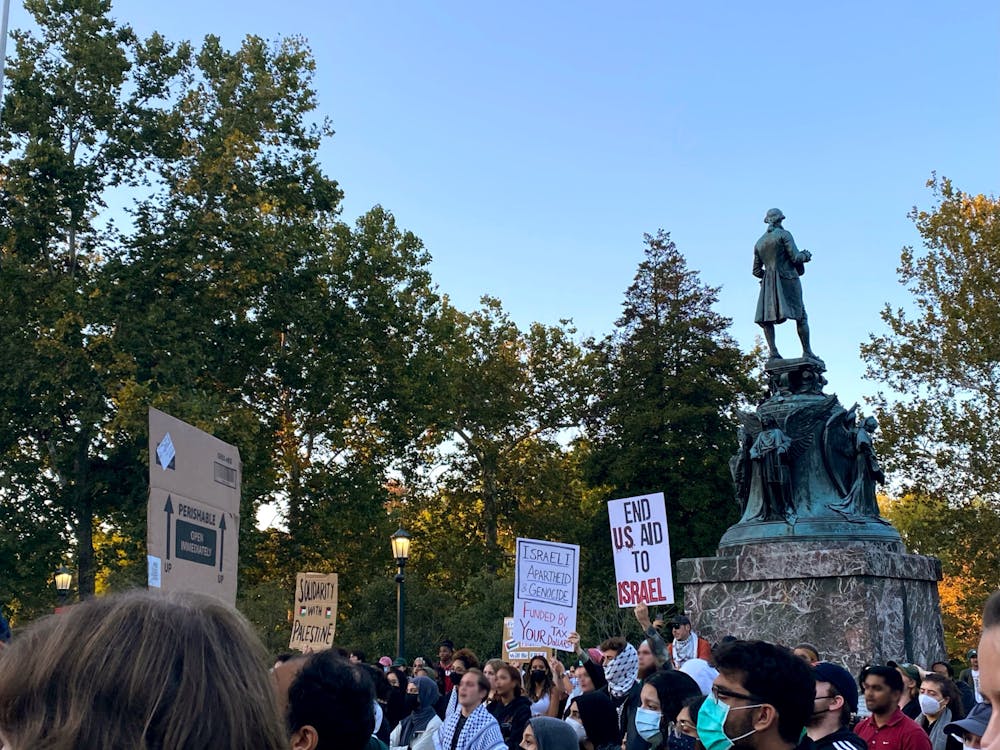A crowd of over a hundred demonstrators from the University and Charlottesville community, all wearing the reds and greens of the Palestinian flag, gathered at the base of the Rotunda steps this Thursday for a teach-in and demonstration entitled “Decolonization is Not a Metaphor: Gaza and Palestinian Liberation.”
The event took place in the wake of the Palestinian militant group Hamas’ surprise attack on Israel on Oct. 7th. The assault resulted in devastating civilian casualties of over 1,000 people in Israel, as well as over 900 in the Gaza Strip neighboring Israel.
Hosted by Students for Justice in Palestine, the rally was primarily centered around educating attendees about Palestine’s history and the need for active education and resistance against Israeli occupation.
The SJP speakers, all of whom said they wanted to remain anonymous for both safety reasons and out of consideration for the Palestinian voices they wanted to amplify, addressed the violent tactics employed by Hamas early on in the demonstration.
“There is no correct way for people to resist oppression,” one speaker said. “When someone has a boot on their neck, we can't pass judgment on how they get it off. Especially when our own government is contributing to their suffering.”
The organization posted a letter in response to the attack to their Instagram account Sunday, the comments for which have now been deactivated. In the post, SJP said they reject the “assumption that oppressed people cannot take liberation into their own hands,” and “unequivocally support…the right of colonized people everywhere to resist the occupation of their land by whatever means necessary.”
Violent resistance, the speakers claimed, was warranted in the face of historical and ongoing oppression on the part of the Israeli state. The Nakba, or the 1948 forcible relocation of Palestinians after the Arab-Israeli war, was a central focus of the first part of the rally and an event speakers said justified resistance to Israeli occupation and expansion into the West Bank.
One speaker described the Nakba not merely as a singular historical event, but an occurrence that has turned into an ongoing reality which actively subjects Palestinians to imprisonment and discrimination. Another claimed that the effects of the Nakba have turned the territory into “the world’s largest open-air prison,” with access to food, water and basic medical supplies cut off by the Israeli government.
A third speaker with SJP spoke on specific Palestinian experiences, reading aloud a written piece from a Palestinian student at the University. In it, the author described her family’s perpetual struggle to gain basic access to treatment or diagnoses in their hometown.
“They both have a mental disability,” the author said of her aunt and uncle in Palestine. “I cannot tell you what disability it is because the hospitals in Palestine don't know. There is a hospital in my family’s town — they call it the hospital where you go to die. My grandfather died because he could not access better healthcare than that.”
Long-standing issues such as healthcare access are exacerbated, SJP said, by the continued and increasing financial aid that the United States is transferring to Israel. Speakers described Israel’s expansion project into the West Bank as “genocidal.” The expansion, an effort by Israel’s right-wing government, approved or advanced 13,000 new construction permits in the West Bank in the first six months of Israeli Prime Minister Benjamin Netanyahu’s government. This increase in Israeli construction in the West Bank has been widely criticized as violating international law.
“All of us have to be loud,” one speaker said. “We have to stand up and decry this genocidal project that is being funded with our tax dollars and cheered on by the Western world… It is incumbent on all of us to make some noise.”
In a letter to the University community released Wednesday morning, University President Jim Ryan said the attacks were an inexcusable atrocity that the University could not condone.
“There can be no justification for, and we must condemn, the actions of Hamas and the horrific violence that has taken place against civilians,” Ryan said. “Sadly, the terrible war it has provoked will undoubtedly mean that more innocent lives will be lost.”
Despite exerting political influence over the Palestinian state, Hamas is a military resistance movement that is not formally a representative of Palestine.
“It is important to note that all Palestinian resistance groups exist only because of Israeli occupation,” an SJP speaker said. “If there was no occupation, there would be no need for a militant political group to interrupt. As long as there are systems of apartheid that exist, resistance to apartheid will exist whether we condemn it or not.”
At the SJP rally, this condemnation took the form of signs that read “Solidarity with Palestine,” “Decolonize U.Va.,” and “Dissenters Turn the Tide,” as well as chants of “free, free Palestine” and “Israel, you can’t hide, you’re committing genocide.”
“From the river to the sea, Palestine will be free,” demonstrators called out as the rally drew to a close.







